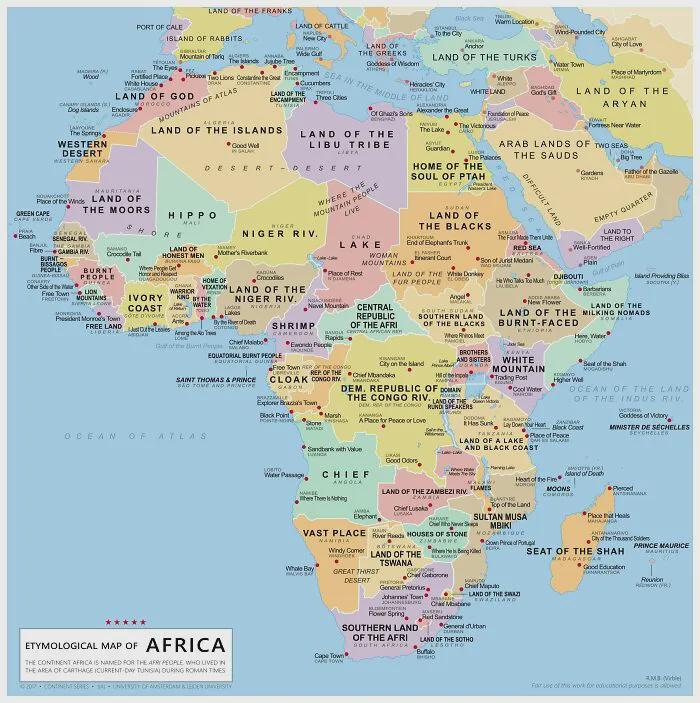Literal Meaning of Every Country's Name in Africa Map


Marcus Rodriguez
Historical Geography Expert
Marcus Rodriguez specializes in historical cartography and geographic data analysis. With a background in both history and geography, he brings unique...
Geographic Analysis
What This Map Shows
This map presents the literal meanings of every African country's name, providing a fascinating glimpse into the cultural and historical significance embedded within these names. Each name reflects the country’s heritage, language, and sometimes even its geography. For instance, many country names derive from indigenous languages, colonial histories, or significant regional features. This visualization invites us to explore not just the geography of Africa, but also its rich tapestry of cultures and histories.
Deep Dive into the Names
The literal meanings of country names in Africa can reveal much about the continent's diverse cultures and languages. For example, the name "Egypt" comes from the Greek word "Aigyptos," which in turn is derived from an ancient Egyptian name that refers to the city of Memphis. In contrast, "South Africa" literally means the southern part of Africa, a straightforward description that conveys geographical positioning.
Interestingly, many African countries have names that highlight their geographic features or historical contexts. For instance, "Kenya" is derived from Mount Kenya, which is named after the Kikuyu word "Kere-Nyaga," meaning "God’s Resting Place." This reflects the deep spiritual connection that the Kikuyu people have with the mountain.
Moreover, some names reflect colonial experiences. "Namibia," for example, is derived from the Namib Desert, emphasizing its arid landscapes, but it also carries the weight of a history marked by colonialism and the fight for independence. Similarly, "Zimbabwe" comes from the Shona phrase "dzimba dza mabwe," meaning "houses of stone," referring to the Great Zimbabwe ruins, a testament to the advanced civilization that once thrived there.
Throughout Africa, language diversity plays a crucial role in the meanings of country names. Many names are derived from local languages, showcasing the continent's rich linguistic heritage. For instance, "Tanzania" combines the names of two regions: Tanganyika and Zanzibar. This combination not only acknowledges the geographic unity of the nation but also celebrates the cultural diversity of its people.
Such linguistic diversity also highlights the historical migrations and interactions among different ethnic groups across Africa. Have you ever noticed how many names are tied to the natural environment? For instance, "Malawi" is thought to come from the word "mulanje," referring to the country's prominent mountain, while "Burkina Faso" translates to "the land of honest men" in the Mossi and Dioula languages, showcasing cultural values.
Regional Analysis
When analyzing the names of African countries regionally, distinct patterns emerge. In North Africa, names often have Arabic origins, reflecting the historical influence of Arab culture and Islam. For example, "Libya" comes from an ancient Berber word for the region, while "Tunisia" derives from the Arabic word "tunis," which means to camp or settle. The names in this region often evoke a sense of historical continuity and the importance of trade and cultural exchange.
In West Africa, many country names reflect the rich tapestry of ethnic groups and historical kingdoms. Countries like "Nigeria" are named after the Niger River, emphasizing the significance of this waterway in the region's development. Meanwhile, "Ghana" refers to the ancient Ghana Empire, connecting the modern nation to its illustrious past. This naming pattern highlights the pride in heritage and the importance of historical narratives.
In contrast, East Africa’s names often celebrate natural features or indigenous languages. For instance, "Uganda" is thought to derive from the Swahili term for the area around Lake Victoria, while "Rwanda" translates to "the land of a thousand hills," a fitting description of its stunning landscape. This regional analysis underscores how geography, history, and culture intertwine in the naming of countries across the continent.
Significance and Impact
Understanding the literal meanings of African country names is more than just an academic exercise; it has real-world implications. These names often reflect national identities and can foster a sense of pride among citizens. As many countries in Africa continue to navigate post-colonial identities, the meanings of their names can serve as a reminder of their unique heritage and the importance of preserving cultural narratives.
Moreover, as globalization continues to impact African nations, understanding these names can help in promoting cultural tourism and education. Countries can leverage their histories and names to attract visitors interested in authentic experiences. For instance, highlighting the significance of names can enrich travel narratives and foster a deeper appreciation for the diverse cultures within Africa.
In conclusion, the literal meanings of country names in Africa offer a window into the continent's rich cultural tapestry. They remind us that behind every name is a story waiting to be told. As we continue to explore and understand Africa, let’s remember that these names are more than just labels; they embody the histories, struggles, and aspirations of the people who inhabit these lands.
Visualization Details
- Published
- September 20, 2025
- Views
- 76
Comments
Loading comments...